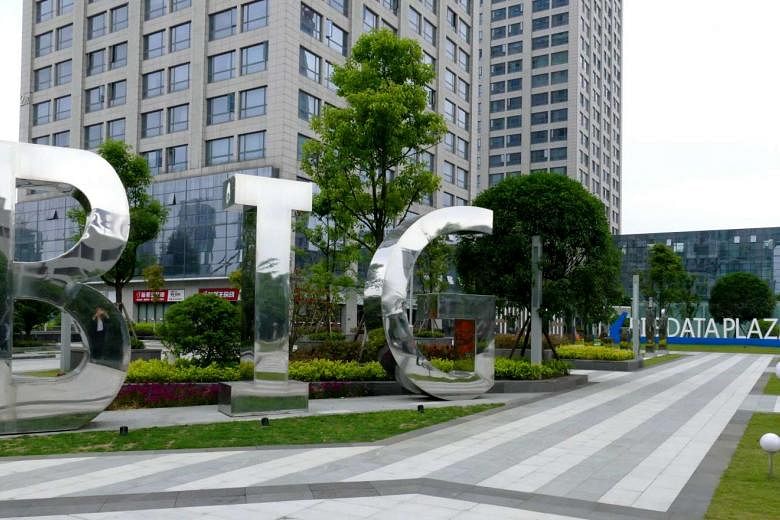GUIYANG - Guiyang, the capital of China's south-western province of Guizhou, was once shrouded in smog but is now exceptionally clean by Chinese standards. It is also exceptionally busy this week (May 26-29).
A conference in Guiyang on big data has drawn top executives of major global and Chinese electronics giants Dell Inc., Foxconn Technology, Tencent Holdings, Baidu Inc., and Didi Chuxing Technology Inc., among others.
They came to see what Guiyang has to offer and also to meet Premier Li Keqiang and senior ministers. The plan for Guizhou - and Guiyang's Big Data Application and Exhibition Centre - has received the personal endorsement of President Xi Jinping.
Big data is a rising field that involves record-keeping and processing huge amounts of data for Internet companies. Guizhou wants to attract investment, and the Big Data Centre's showroom is one the ministers and CEOs will certainly have been shown.
It is designed to dazzle. Wall to wall screens and even the floor are filled with flowing bits of light representing data. A gigantic digital map, provided by Alibaba, shows the number of hacking attacks against networks in real time.
One walks through a miasma of disorienting light resembling a movie set from The Matrix.
There is more: A new-generation vending machine doesn't stock drinks and snacks, but features a camera and screen through which you can contact a doctor, video conference, and then pay and have a range of drugs dispensed as per the diagnosis and prescription.
Big data, innovation, engineering, remote diagnosis, remote health care and medication is the future, and the future is here in Guiyang. And it is clean and green.
Now to catch up with it.
One should not underestimate Guizhou. In June 2015 President Xi gave the province a significant boost, sketching out a future in innovation. It is his endorsement that has brought Guiyang this far.
Foxconn, the global electronics giant from Taiwan, has put some of its data storage here - not at the Big Data Centre but in a cave in a mountainside where it does not need air conditioners to keep cool, the local officials said. The province's mostly cool weather is good for saving energy costs, they say.
Back in 2014 Foxconn said it would sign agreements with Guizhou to research and develop big data technology and nanotechnology. And this month, it was reported that Foxconn's Huawei Technologies would be setting up a factory in Guizhou to make smart phones.
Guizhou is a province of 40 million, and considered one of China's poorest. At the height of its economic growth it was dirty industries like mining and chemicals that powered growth. For the last five years Guizhou's economy has grown by 12-13 per cent.
However an estimated 4.9 million of its people live in poverty - mostly in rural areas in the rugged province which is home to several ethnic minorities. Some, like the Miao, dress up in tribal finery for tourists in quaint villages - but behind the dances and the trinkets life is hard work: old women must slog slowly up and down steep mountain paths with a week's supply of firewood on their backs.
The countryside is in parts stunningly beautiful and already attracts tourists, prominent among them Singaporeans, Koreans and Japanese.
Officials take pride in the province's good air and water quality - most of it is mountains covered with scrub or secondary forest.
The annual average temperature is 15 deg C. Off the road to Kaili, where the tourists go to see the Miao with their silver headdresses, one could see a row of smokestacks over the horizon - but there was also a row of wind turbines on a ridge.
Guizhou has joined China's shift towards a greener economy, partly driven by rising public annoyance at the pollution of years of breakneck industrialisation, and partly by international obligations to peak and reduce its fossil fuel emissions.
Madam Shen Yiqin, Deputy Party Secretary of the Chinese Communist Party's Guizhou Provincial Committee, Beijing's top person in the province, said as much in a discussion with a group of foreign journalists in Guiyang last month.
"This is a new way of growth, without sacrificing the environment," she told the group, including this reporter, who were on the 2016 Jefferson Fellowship.
"President Xi has said we should go a new way, we should not pollute the environment and then have to fix it."
It is a measure of the degree of pollution China has been going through, that Guiyang's pleasant environment - notwithstanding huge tracts blasted and gouged out of mountains to be built up - is the top talking point of provincial and city officials.
Guiyang is a city in waiting. But outside the Big Data centre itself - a largely empty complex except for a handful of companies - are stacks upon stacks of half built apartment blocks, almost all empty. Local city officials say real estate demand and supply are ''in balance'' but it doesn't look it; in fact Guiyang has long been the epicentre of China's overbuilt real estate crisis.
Here they also built for the future, but it hasn't arrived yet.




